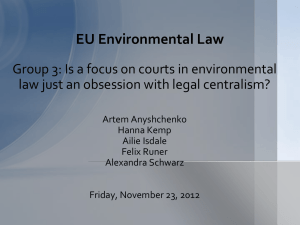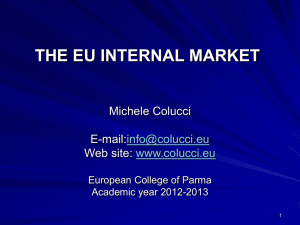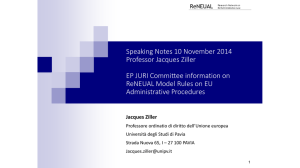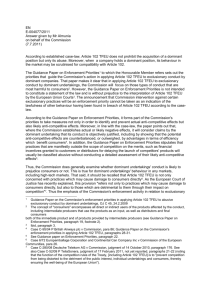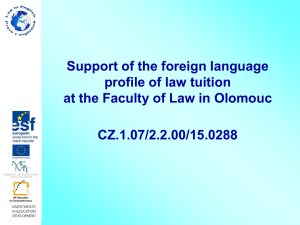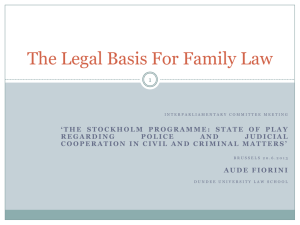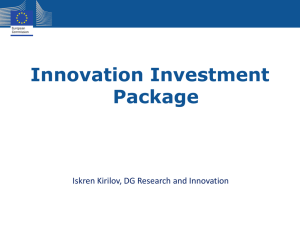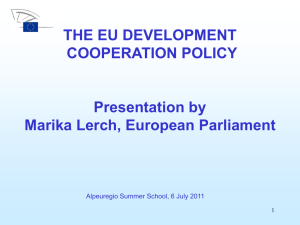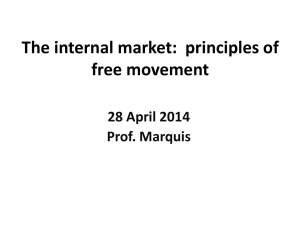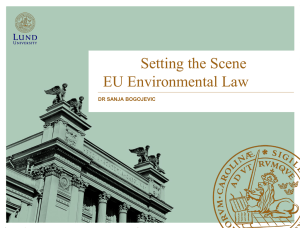Internal market law
advertisement
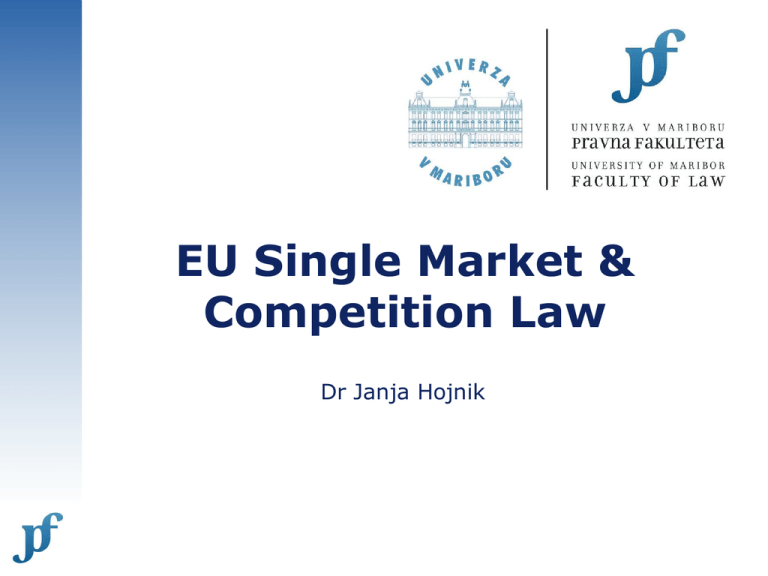
EU Single Market & Competition Law Dr Janja Hojnik Brief introduction into EU law 2 The EU institutions 7 institutions The political “institutional triangle” plus three non-political institutions 3 EU Court Court of Auditors European Central Bank 2 advisory committees EC Commission Council of EU + European Council The European Parliament Economic and Social Committee (ECOSOC) Committee of Regions (COR) 30 agencies and decentralised bodies University of Maribor - Faculty of Law EU institutions & interests representation Commission: Council: economic and social actors interest Committee of Regions: 4 interests of European Peoples Economic and Social Committee: MS (governments)’ interests European Parliament: interests of the EU interests of local authorities University of Maribor - Faculty of Law ‘The Flow of Powers’ ©www.news.bbc.co.uk 5 University of Maribor - Faculty of Law Brussels – the capital of the EU? 6 University of Maribor - Faculty of Law EU Legal Sources Primary sources: Secondary sources: 7 Treaty on European Union Treaty on Functioning of EU Charter of the EU on fundamental rights General principles of EU law International treaties Regulations Directives Decisions Recommendations and opinions… Case-law of the EU Court of Justice Nature of EU Law 8 PRINCIPLES OF SUPREMACY AND AUTONOMY PRINCIPLE OF DIRECT EFFECT PRINCIPLE OF STATE LIABILITY FOR DAMAGES Economic liberalisation What are it’s advantages? What are it’s disadvantages? 9 Why are EU Member States not satisfied with WTO membership only? Basic Elements of the Stages of Economic Integration Free Trade Agreement (FTA) Customs Union (CU) Common Market (CM) Economic Union (EU) 10 Zero tariffs between member countries and reduced non-tariff barriers FTA + common external tariff CU + free movement of capital and labour, some policy harmonization CM + common economic policies and institutions INTERNAL MARKET Free movement of goods Free movement of persons Free movement of capital Free movement of services & freedom of establishment - FOUR FREEDOMS 11 EU-2012 12 FOUNDAMENTAL PRINCIPLES 1. 2. 3. 13 The principle of non-discrimination: Art 18 TFEU prohibits "any discrimination on grounds of nationality“; it is prohibited to treat imported goods differently to domestic goods etc. Discrimination is understood as meaning different treatment, on the basis of nationality, under the same circumstances and vice versa; Mutual recognition (derives from the case law) The principle claims that the legislation of another Member State is equivalent in its effects to domestic legislation This principle was laid down by the Court of Justice in the Cassis de Dijon judgment. Although this principle of mutual recognition applies chiefly to products, it has also had an impact on the other freedoms, particularly those involving the performance of services, where it underlies the concept of the recognition of diplomas. EU legislation (in addition to the principle of mutual recognition): Treaty provisions, regulations and directives. FREE MOVEMENT OF GOODS 14 Obstacles to Inter-State Movement of Goods 1. 2. 3. 15 Custom duties and charges having equivalent effect (Arts. 28-33)) Discriminatory taxation (Art. 110) Quantitative restrictions on imports and exports (quotas) and all measures having equivalent effect (Arts. 34-36) Quantitative Restrictions and MEE (Articles 34 and 35 TFEU) 16 Quantitative restrictions on imports and all measures having equivalent effect shall be prohibited between Member States. Procureur du Roi v. Dassonville (case 8/74): seminal case that establishes: - Dassonville formula: All trading rules enacted by MS which are capable of hindering, directly or indirectly, actually or potentially, intra-Community trade are to be considered as measures having an effect equivalent to quantitative restrictions Categories of Measures Possibly Caught in Violation of Art. 34 by the Dassonville Formula 1. Discriminatory measures on the ground of nationality – applying only to imports or differently than to national products (German Quality Products case C-325/00); it is not only discrimination alone but also discriminatory effect 2. Non-discriminatory measures: so-called product requirements, related to the production and marketing of goods that apply without distinction to both foreign and domestic goods but it is usually more burdensome for foreign companies/goods (Casis de Dijon case 120/78) 3. Selling arrangements: category created by Keck case C267/91 related to socio-economic measures as to how goods should be sold (manner of sale) – WHERE; WHEN; HOW 17 Cassis Principles: 1. Mutual Recognition: There is no valid reason why, provided that goods have been lawfully produced and marketed in one MS, they should not be introduced into any other MS. 2. The Rule of Reason: Certain measures, even if within Dassonville formula, will not breach Art. 28 if they are necessary (proportionality) to satisfy mandatory requirement (objective justification) relating in particular to the effectiveness of fiscal supervision, the protection of public health, the fairness of commercial transactions and the defence of the consumer. After Cassis: Gilli & Andres, 788/79 – apple vinegar Walter Rau, 261/81 – margarine & butter Drei Glocken, 407/85 – grano duro Commission v Italy, C-14/00 – chocolate 18 Exceptions to Free Movement of Goods 19 Article 36 TFEU: The provisions of Articles 34 and 35 shall not preclude prohibitions or restrictions on imports, exports or goods in transit justified on grounds of - public morality, public policy or public security; - the protection of health and life of humans, animals or plants; - the protection of national treasures possessing artistic, historic or archaeological value; or - the protection of industrial and commercial property. Cassis Principle of Objective Justification excuses non-discriminatory rules as long as they are proportionate and justified; non-exhaustive list of justifications; see: Danish Bottles 302/86 Questions for discussion: 20 Is FMG breached in case a Member State prohibits importation of pornographic magazines? Is FMG breached in case a state trade association promotes buying national products? Is FMG breached in case a Member State requires all the bycicles on its territory should be in line with that Member State’s technical provisions? Is FMG breached in case a Member State prohibits Sunday trading? Is FMG breached in case a Member State prohibits advertisements of alcohol? Is FMG breached in case a Dutch mayor prohibits other EU-nationals from attending coffee-shops? FREE MOVEMENT OF WORKERS 21 Article 45 TFEU 1. Freedom of movement for workers shall be secured within the Union. 2. Such freedom of movement shall entail the abolition of any discrimination based on nationality between workers of the Member States as regards employment, remuneration and other conditions of work and employment. 3. It shall entail the right, subject to limitations justified on grounds of public policy, public security or public health: (a) to accept offers of employment actually made; (b) to move freely within the territory of Member States for this purpose; (c) to stay in a Member State for the purpose of employment in accordance with the provisions governing the employment of nationals of that State laid down by law, regulation or administrative action; (d) to remain in the territory of a Member State after having been employed in that State, subject to conditions which shall be embodied in regulations to be drawn up by the Commission. 4. The provisions of this Article shall not apply to employment in the public service. 22 Who derives rights from Art 45 TFEU and the secondary legislation Workers Their family members 23 ‘parasite rights’ spouse + descendants till the age of 21 unmarried partner (Reed, 59/85) divorced spouse (Diatta, 267/83) supported ancestors of the worker and spouse other family members – if supported by the worker and lived in common house-hold not need to be EU citizens Material scope of the freedom Accept actual job offers Right to enter and reside in another MS (Directive 2004/38) Free movement within the MS for job search purposes Non-discriminatory chances for employment Work conditions, social rights, tax benefits Right of education Retirement and right to stay in the MS. 24 Justifications for barriers to move Discriminatory measures – justifications in Art 45: Public policy, security and health Public service Non-discriminatory measures – objective justifications (rule of reason) Protection of consumers… 25 European Citizenship Article 20 TFEU 1. Citizenship of the Union is hereby established. Every person holding the nationality of a Member State shall be a citizen of the Union. Citizenship of the Union shall be additional to and not replace national citizenship. 2. Citizens of the Union shall enjoy the rights and be subject to the duties provided for in the Treaties. They shall have, inter alia: (a) the right to move and reside freely within the territory of the Member States; (b) the right to vote and to stand as candidates in elections to the European Parliament and in municipal elections in their Member State of residence, under the same conditions as nationals of that State; (c) the right to enjoy, in the territory of a third country in which the Member State of which they are nationals is not represented, the protection of the diplomatic and consular authorities of any Member State on the same conditions as the nationals of that State; (d) the right to petition the European Parliament, to apply to the European Ombudsman, and to address the institutions and advisory bodies of the Union in any of the Treaty languages and to obtain a reply in the same language. These rights shall be exercised in accordance with the conditions and limits defined by the Treaties and by the measures adopted thereunder. 26 Questions for discussion! 27 Does an employer breach FMW rules if he requires from the employees language proficiency? Is there a freedom of movement of poor people in the EU? FREE MOVEMENT OF SERVICES AND FREEDOM OF ESTABLISHMENT 28 2 ways of movement for self-employed: -They can move on the territory of another MS with the purpose to perform economic activity on permanent basis by establishing there (Art 49 TFEU) FREEDOM OF ESTABLISHMENT They can go for fixed period of time to another MS with the purpose of performing a service for appropriate payment and after that they return on the territory of the MS of establishment (Art 56 TFEU) - - 29 FREE PROVISION OF SERVICES Why is the distinction relevant? “the essential aspect of the difference between temporary provision of services or provisional activity at one hand and establishment on the other is, that a person providing a service is not bound by competences and control of the national authorities of the state, where such service is performed.” A-G in Van Binsbergen, 33/74 ASPECTS OF THE DISTINCTION: 30 RECOGNITION OF PROFESSIONAL QUALIFICATIONS REGISTRATION, PERMISSION TO PERFORM SOCIAL AND TAX BENEFITS Freedom of establishment Primary Secondary Self-employed persons Companies 31 BARRIERS TO SINGLE MARKET Requirement of nationality Non-recognition of professional qualifications Single business unit requirement Knowledge of language Limiting access to social benefits 32 Limiting access to various infrastracture (more advantageous loans for nationals; limited access to real estate) Other barriers to free movement. Justifying barriers to FE and FPS Legitimate reason public authority, public policy, security, health Other reasons recognised in the Court’s case law Human rights, rights of workers etc (Viking, Laval…) Fraudolent activity (Centros) Proportional measure Individualized measure 33 Proof of fraudolent purpose case by case (Centros) Questions for discussion! 34 Is FMS breached if a Member States requires all their notaries public to have that MS nationality? Is FMS breached if a Member States prohibits provision of gambling services from other MSs? FREE MOVEMENT OF CAPITAL 35 FREE MOVEMENT OF CAPITAL Article 63 TFEU 1. Within the framework of the provisions set out in this Chapter, all restrictions on the movement of capital between Member States and between Member States and third countries shall be prohibited. 2. Within the framework of the provisions set out in this Chapter, all restrictions on payments between Member States and between Member States and third countries shall be prohibited. 36 Meaning of ‘capital’ Directive 88/361/EEC for the implementation of Article 56 – Anex I: DIRECT INVESTMENTS INVESTMENTS IN REAL ESTATE OPERATIONS IN SECURITIES OPERATIONS IN UNITS OF COLLECTIVE INVESTMENT UNDERTAKINGS OPERATIONS IN CURRENT AND DEPOSIT ACCOUNTS WITH FINANCIAL INSTITUTIONS FINANCIAL LOANS AND CREDITS PERSONAL CAPITAL MOVEMENTS PHYSICAL IMPORT AND EXPORT OF FINANCIAL ASSETS Etc. 37 Removing barriers to FMC between MS: 1) discriminatory; 2) non-discriminatory. Removing barriers to FMC between MS and third countries: - Art 64(1) TFEU: The provisions of Article 63 shall be without prejudice to the application to third countries of any restrictions which exist on 31 December 1993 under national or Community law adopted in respect of the movement of capital to or from third countries - EU Court in case A, C-101/05: despite both aspects of FMC being included in the same sentence these freedom in fact includes two principles with distinct logic and different interpretation of justifiable exceptions. 38 Question for discussion! 39 Is FMC breached by guaranteeing golden shares to EU Member States? Close relation of FMC with EMU 3 stages; 5 basic conditions; 17 MS; Benefits and costs of participating in the euro-zone. 40 Euro crisis – political debate No. 1 in Europe… 41 From a war to the United States of Europe 42 Rostowski: "You know, after all these political shocks, economic shocks, it is very rare indeed that in the next 10 years we could avoid a war." UBS: "historically, monetary unions do not break up without civil war or some other form of authoritarian reaction". How have we come this far? • From the financial and economic crisis to the sovereign debt crisis in the EU 43 EMU – the first monetary union of independant states… 44 Rating S&P's Europa 06-2011 Saving euro 45 Short-term – by capital injections Long-term – by creating a fiscal union At the precipice of unbridled challenges, the Euro will soldier on. Why? …Because it must! M. Davies 46 EU COMPETITION LAW 47 Discussion questions: What are the aims of rules on competition? What are the benefits of an undistorted competition? Why is EU regulating competition? Who can hinder competition on the EU market? 48 Article 101 TFEU 1. The following shall be prohibited as incompatible with the common market: all agreements between undertakings, decisions by associations of undertakings and concerted practices which may affect trade between Member States and which have as their object or effect the prevention, restriction or distortion of competition within the common market, and in particular those which: (a) directly or indirectly fix purchase or selling prices or any other trading conditions; (b) limit or control production, markets, technical development, or investment; (c) share markets or sources of supply; (d) apply dissimilar conditions to equivalent transactions with other trading parties, thereby placing them at a competitive disadvantage; (e) make the conclusion of contracts subject to acceptance by the other parties of supplementary obligations which, by their nature or according to commercial usage, have no connection with the subject of such contracts. 2. Any agreements or decisions prohibited pursuant to this article shall be automatically void. 49 3. The provisions of paragraph 1 may, however, be declared inapplicable in the case of: - any agreement or category of agreements between undertakings, - any decision or category of decisions by associations of undertakings, - any concerted practice or category of concerted practices, which contributes to improving the production or distribution of goods or to promoting technical or economic progress, while allowing consumers a fair share of the resulting benefit, and which does not: (a) impose on the undertakings concerned restrictions which are not indispensable to the attainment of these objectives; (b) afford such undertakings the possibility of eliminating competition in respect of a substantial part of the products in question. 50 Article 102 TFEU Any abuse by one or more undertakings of a dominant position within the common market or in a substantial part of it shall be prohibited as incompatible with the common market in so far as it may affect trade between Member States. Such abuse may, in particular, consist in: (a) directly or indirectly imposing unfair purchase or selling prices or other unfair trading conditions; (b) limiting production, markets or technical development to the prejudice of consumers; (c) applying dissimilar conditions to equivalent transactions with other trading parties, thereby placing them at a competitive disadvantage; (d) making the conclusion of contracts subject to acceptance by the other parties of supplementary obligations which, by their nature or according to commercial usage, have no connection with the subject of such contracts. 51 Article 107 TFEU 1. Save as otherwise provided in the Treaties, any aid granted by a Member State or through State resources in any form whatsoever which distorts or threatens to distort competition by favouring certain undertakings or the production of certain goods shall, in so far as it affects trade between Member States, be incompatible with the internal market. 2. The following shall be compatible with the internal market: (a) aid having a social character, granted to individual consumers, provided that such aid is granted without discrimination related to the origin of the products concerned; (b) aid to make good the damage caused by natural disasters or exceptional occurrences; (c) aid granted to the economy of certain areas of the Federal Republic of Germany affected by the division of Germany, in so far as such aid is required in order to compensate for the economic disadvantages caused by that division. Five years after the entry into force of the Treaty of Lisbon, the Council, acting on a proposal from the Commission, may adopt a decision repealing this point. 52 Thank you for your attention! Contact: janja.hojnik@um.si 53
